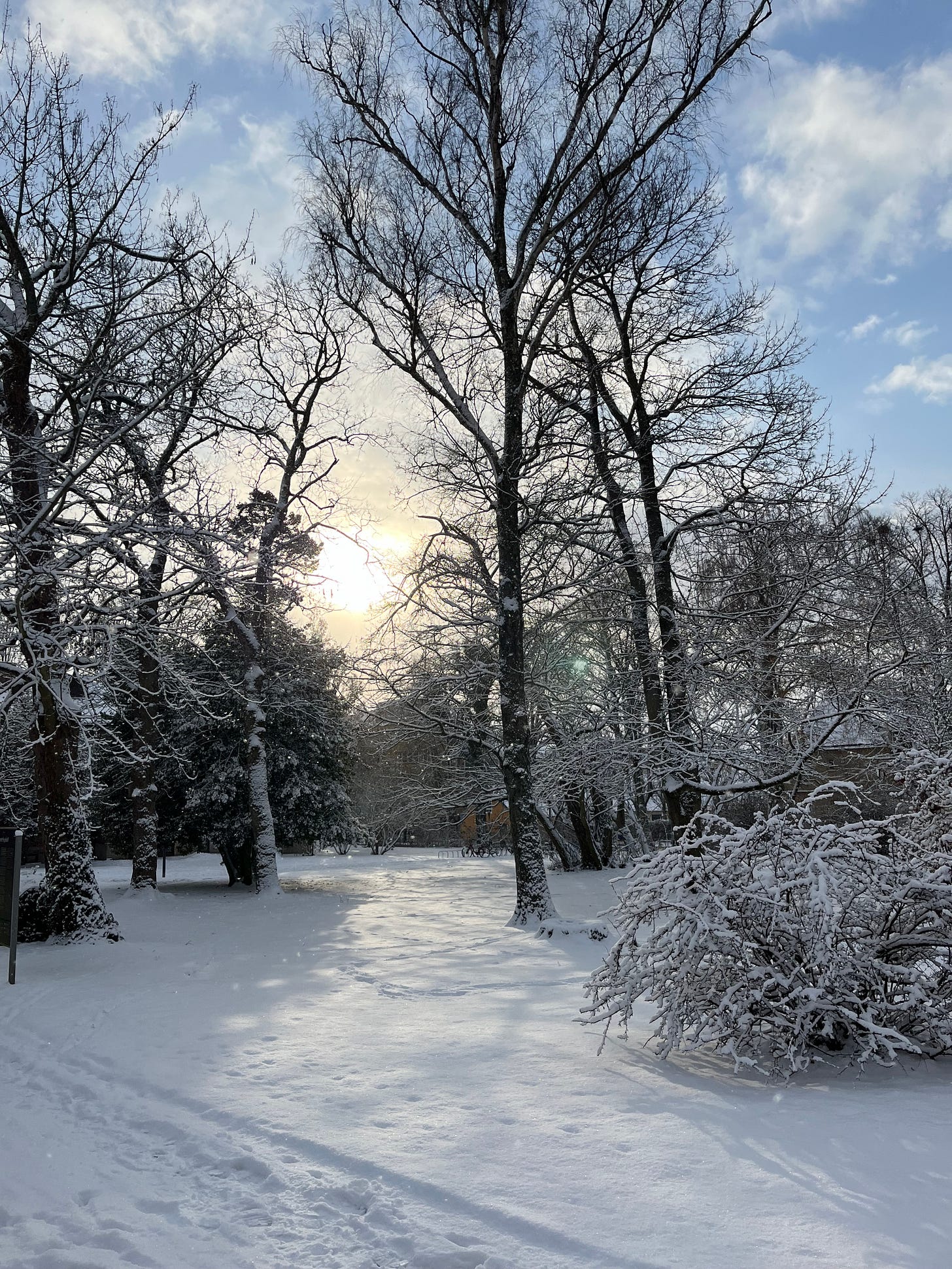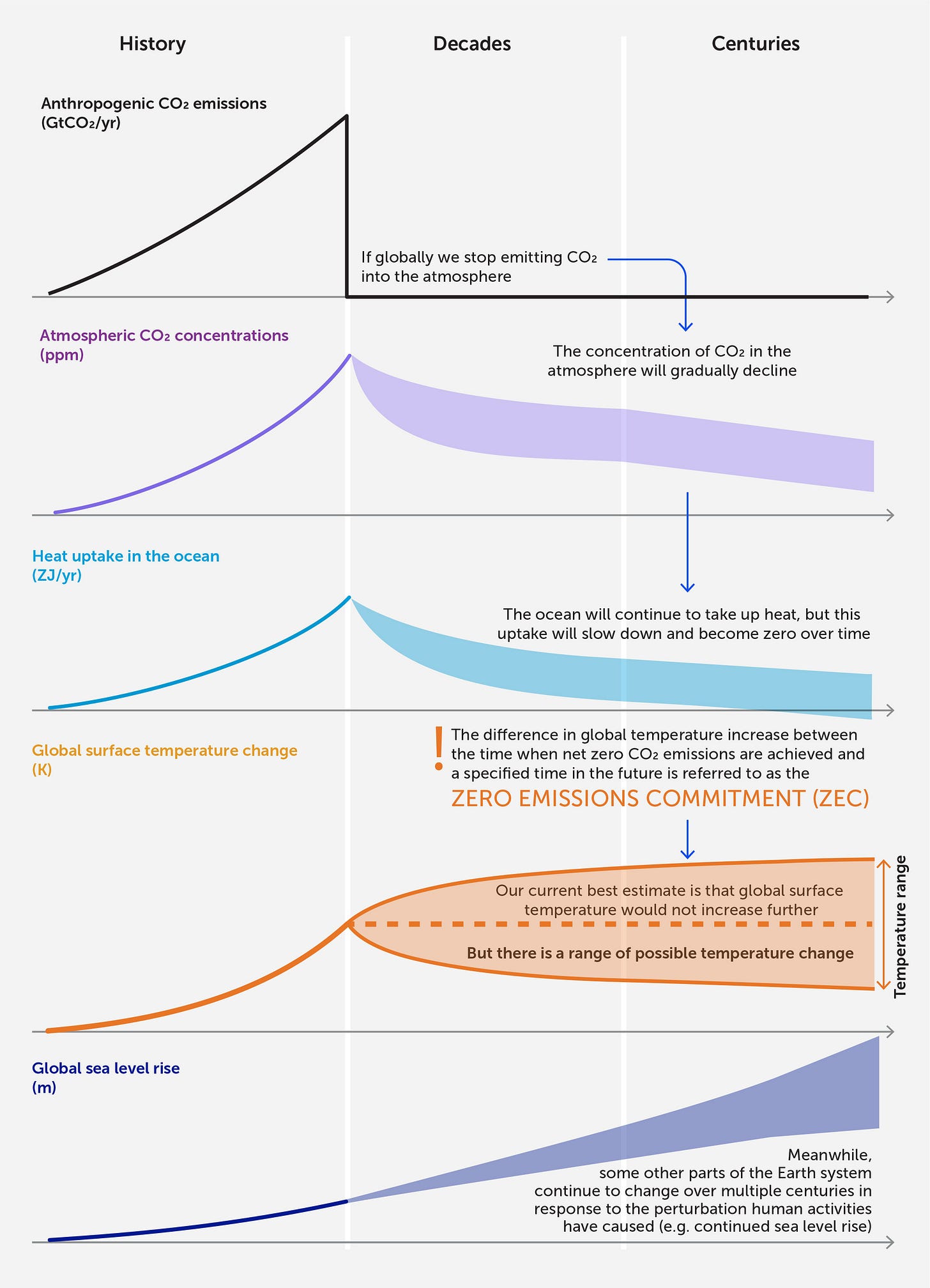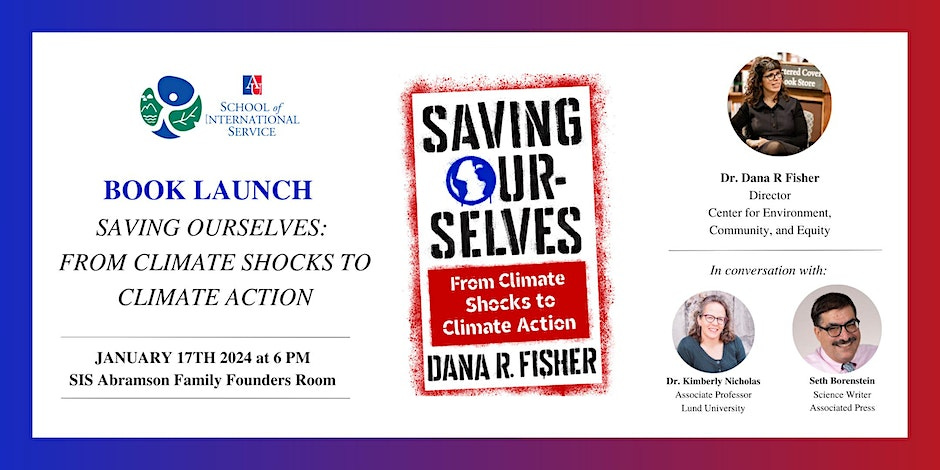When to Give Up on Climate
Facts: What matters is now⏱️ | Feelings: When to give up 🤷♀️ | Action: Real rest🧘♀️
Welcome to We Can Fix It, where we tackle the climate crisis with facts, feelings, and action, written by me, climate scientist Kim Nicholas.
Hi friends,
I joined a snowball fight with my students today! It was a lovely interlude of fun and play in a busy sprint towards the end of term. I hope you’re getting a few moments of joy too!
Facts: What Matters is Now
There’s a common misconception that we are committed to decades or centuries more global warming from CO2 already in the atmosphere, no matter what we do now.
Happily, current science says this is not true.
The main cause of ongoing warming is CO2 emissions humans continue to produce, not past emissions, as climate scientist Damon Matthews wrote in a recent article in Frontiers in Science.
A new study led by Sofia Palazzo Corner illustrates current scientific understanding beautifully.
When human emissions of CO2 go to zero
(≈ we leave fossil fuels in the ground & stop destroying nature):
→ the concentration of CO2 in the atmosphere will gradually decline (as natural land and ocean sinks take up carbon)
→ the ocean will continue to take up heat, but this will slow down and eventually stop
→ global temperature will basically stabilize
Hey, this is all good news! 🥳
Humans have the power to stop warming, and prevent many of its dangerous impacts from getting worse.
Yeah, then there’s some bad news, in that purple part at the bottom of the figure.
Some changes in the Earth system, like sea level rise, will continue even after global warming stops.😬
Still, it’s a big deal that the most important driver of how much warming we live through, and leave behind, depends on how fast we stop emitting CO2.
This illustration shows CO2 emissions going to zero overnight, which is not possible. Our planet will continue to warm until we shut down the very last car and factory and power plant belching out carbon.
But! How fast we bend the emissions curve by phasing out fossil fuels is up to us.
It’s the inertia in human systems of politics, business, and society, not the laws of physics, that determine how much more warming is unavoidable.
Feelings: When to Give Up
I’ve heard from readers lately who are struggling to keep doing climate work, amidst *waves hands frantically at the world in late 2023*.
In case it helps, here’s how I’ve navigated the temptation to give up, which I wrote about in Under the Sky We Make:
I don’t want to belittle the temptation to give up in the midst of this mess, because this work is really hard, and I struggle with this temptation myself. Humans have set in motion a planetary-scale warming experiment with impacts that will last for millennia. The headlines about the latest ice-sheet collapse or coral bleaching only hint at the scope of the destabilization we’re fighting against. There is so much we have to do, and so little time to do it. And I, just like you, am just one person.
Even though I spend most of my time working on climate, if I’m honest, most days I don’t have any sense that what I’m doing makes any difference in the world, to the climate, or to other people. What if it is too late for anyone to do anything to make any difference? What if it is already too late for 1.5°C or 2°C because of tipping points lurking just around the corner? Will all my efforts have been a total waste of time? Should I have started that garage winery instead?
On a particularly bad day recently, when the headlines were especially grim and I felt like nothing I’m doing is making any difference at all, I came across a piece on climate activism by Jim Shultz.
(I think I googled something like “climate change when to give up?” Please don’t judge.)
Shultz writes that there are no ways to know what impact we actually have, and no guarantees that what we do will make a difference:
“So we guess, and there are two different ways we can guess wrong. The first is to overestimate our power to change what’s coming and to give people . . . ‘false hope.’ . . . The second is to underestimate what is possible, to believe that we are less powerful than we actually are and to do less than we can. That’s the wrong guess that worries me more. Faced with a choice between disappointment or failing to do all that is possible, I don’t find the decision a hard one to make.”
Hang in there, friends.
Action: Real rest
Okay, so we don’t get to give up on the only home we have.
But we are human beings, not machines. We cannot exist in a constant state of frantic doing. We must rest.

Rest is not about maximising productivity or output. (Hello, relentless achiever productionist paradigm!)
Rest is a necessary end to itself. Real rest truly restores and replenishes you. It doesn’t numb you out, or fill time when you’re avoiding something.
Real rest answers the question: How can I let myself simply be?
So your climate action for this busy time of year, and this critical time for climate, is to make sure you practice rest.
Make a list of things that are draining your energy.
These could be physical, social, mental, sensory, or other drains.
Write down ideas for how to remove, reduce, reschedule, or otherwise make these energy vampires less draining.
Make a list of things that make you feel rested.
Consider possibilities like:
Take breaks during the day. Look out the window, or close your eyes, or get up and stretch for a minute.
Spend time in nature.
Listen to music.
Mindfulness meditation. Just follow your breath for a minute, or try an app. I’ve been using Headspace forever (though I need to get back to a regular practice!)
Take a warm bath.
Enjoy a warm beverage.
Cuddle a person or pet.
Plan to have no plans and protect that time when others ask. (“I have plans to stay home this weekend and just chill on the couch” is valid, as
says!!)Choose boundaries on screen time. (My phone default is set to 30 min/day of social media, and no internet from 10pm-7am & all day on Sundays).
Have a “possum day” (like my friends Cara and Jochen) where you lounge around the house and relax.
And of course, sleep! Sleep is hugely important for health. My friend Dr. Lucy Kalanithi shared these tips for better, more restful sleep. ZZZZZ!
Write down ideas for how to incorporate more rest in your life.
Especially around busy periods, and any activities you deem essential but draining.
Consider:
On a busy day: Plan to take a 1-minute break to close your eyes and breathe between finishing one task and starting another.
During a busy week: Is there 15 minutes you can carve out to let yourself rest?
During a busy season: Can you plan days of rest to follow a time you know you’ll find taxing?
Remember, less is more; as I wrote:
A lot of changing your life for the sake of the environment means trying way less hard, not more. British researchers identified activities to live better and happier while consuming and emitting less; they found the best win-win leisure choices are local outdoor activities, reading, hobbies and games, music, and— lowest emitting of all—“sleep and rest.” Science says: more naps!
But rest alone can’t fix burnout, which is work-related exhaustion, loss of idealism, and feeling you’re bad at what you do. See my tips from last year on preventing or recovering from burnout.
Parting Tidbits
Upcoming events
I have an online badge to #COP28, the big United Nations climate negotiations happening for the next couple weeks. I’m planning to share key updates with you here on We Can Fix It, trying out some new formats like live chats and maybe audio/video updates. Stay tuned here on Substack!
I’ll be at the American Geophysical Union scientific meeting in San Francisco (presenting on Tuesday, Dec 12 and Wednesday, Dec 13). Come find me if you’re there!
I’ll be in Boston, New York, and Washington DC in January. Get in touch if you want to host me for a talk!
Come join us at the book launch for Dana R Fisher’s SAVING OURSELVES at American University in DC on January 17th!
Book Recommendation:
The End, by Mats Strandberg. You learn from the first chapter that an asteroid will wipe out Earth. The question is what to do with the time that remains. A young adult novel that combines love, meaning, and mortality with teen angst, romance, and a murder mystery. The perfect vacation read.
That’s it for this month! I’ll be following my own advice, and taking rest for the end of December, so look for the next regular post from me in the New Year. Take care and thank you so much for reading!
xo,
Kim
P.S. I’ve started recording these newsletters as a podcast for paid subscribers, which I narrate myself. If you’d enjoy listening to your climate facts, feels, and action straight from your favorite climate scientist, and you want to support my work, please upgrade. Thanks for being here!





Richard Heinberg, an author about ecology and energy use here in California, once spoke at a lecture I attended. He was talking about our addiction to fossil fuels and how dependent we have become on them over the past 150+ years. After he'd gone through his slides, a woman from the back of the room raised her hand and said, "This is SO depressing! How can you get up in the morning and keep going?" Heinberg looked at her with a warm smile and said, "It's easy: Optimism is the only viable strategy." He'd just said, so succinctly, what I've been trying to tell folks: Working with the belief that you ARE making a difference is the only way forward. Living with despair and doing nothing is a self-fulfilling prophecy.
More naps as part of a climate solution? Sign me up!